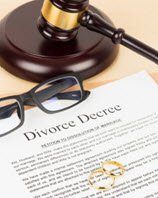The Consequences of Misconduct during Divorce

Divorce requires rehashing parts of a marriage that are painful to remember, and giving up things and places that held significant value in a spouse’s life. Some spouses become so soured by the experience, and resentful the relationship did not work out as envisioned, that they will take matters into their own hands to get a result they believe is fair. When this type of motivation becomes apparent, misconduct in the divorce case becomes a risk the other spouse should anticipate. In extreme cases, this misconduct can lead a spouse to manipulate or destroy evidence, dispose of marital property with the intent of gaining an advantage in the divorce, and/or deprive the other spouse of an asset he/she may want. Even those that should know the ramifications of such actions can fall prey to this temptation. A state court judge in Michigan was recently charged with committing perjury and destroying evidence in her 2016 divorce case, which could lead to criminal punishment, as well as removal from the bench for ethical violations. While the professional repercussions do not apply in most divorce cases, the potential for criminal punishment, as well as negative consequences for the outcome of the divorce absolutely do. A discussion of the types of behavior that would be considered misconduct, and how judges would use this information when deciding a divorce case, will follow below.
What Would Be Considered Misconduct?
To ensure legal proceedings are fair and accurately reflect the position of each party, certain rules must be followed once litigation is started. First, and foremost, all documents filed with the court are required to be truthful and accurate, and this rule also applies to any requests for information from the other side, which typically involves answering a series of questions, called interrogatories, and in some cases, participating in a deposition. For both requests, the law requires the responding spouse tell the truth, and take an oath to that effect. Attempting to deceive the other side or telling outright lies can subject a spouse to allegations of perjury. In addition to obligations to tell the truth, both spouses have a duty to preserve marital property once the divorce case is initiated. This rule is in place to prevent one spouse from selling or giving away assets he/she knows the other spouse wants, and also extends to hiding assets so they are kept out any property settlement agreement. The court expects, and the law requires, all marital property be divided, not just those assets a spouse is willing to give up.
Finally, another way misconduct in a divorce case can manifest is through the destruction of evidence, such as the alteration or deletion of electronic records, or physically destroying something that is relevant to the case, whether that be an asset or documents.
Impact on a Divorce Case
Courts cannot issue legitimate decisions if the information provided to them is false. Thus, judges do not look kindly on attempts to manipulate a case, and the court’s view of what should be considered when issuing a decision. The biggest impact misconduct can have on the outcome of a divorce petition is on the property division. Florida law requires division of marital property be equitable or fair, and if misconduct is shown, the offending spouse is likely to see his/her share of marital assets significantly reduced. This approach is supported by the fact that divorce judgments are always subject to revision for fraudulent financial affidavits, whereas all other grounds are limited to just one year.
Talk to a Florida Divorce Attorney
Relying on the other spouse to tell the truth in divorce is, unfortunately, not always possible. This reality is a big reason why having an experienced divorce attorney on your side is so important. The attorneys at the Donna Hung Law Group know what to look for when suspicions of misconduct exist, and can help you use this information to obtain a favorable outcome. Contact the Orlando divorce law firm at (407) 999-0099 for a consultation.
Resource:
detroitnews.com/story/news/michigan/2018/12/13/livingston-county-judge-charged-perjury-tampering/2304476002/
https://www.donnahunglaw.com/your-right-to-access-joint-accounts-in-divorce/

